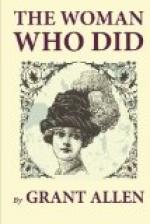“She has tried to,” Dolly answered. “But I will have nothing to do with them. I hate her ideas, and her friends, and her faction.”
Sir Anthony drew her forward and gave her a sudden kiss. Her spirit pleased him.
“That’s well, my child,” he answered. “That’s well—for a beginning.”
Then Dolly, emboldened by his kindness,—for in a moment, somehow, she had taken her grandfather’s heart by assault,—began to tell him how it had all come about; how she had received an offer from a most excellent young man at Combe Mary in Dorsetshire,—very well connected, the squire of his parish; how she had accepted him with joy; how she loved him dearly; how this shadow intervened; how thereupon, for the first time, she had asked for and learned the horrid truth about her parentage; how she was stunned and appalled by it; how she could never again live under one roof with such a woman; and how she came to him for advice, for encouragement, for assistance. She flung herself on his mercy. Every word she spoke impressed Sir Anthony. This was no mere acting; the girl really meant it. Brought up in those hateful surroundings, innate purity of mind had preserved her innocent heart from the contagion of example. She spoke like a sensible, modest, healthy English maiden. She was indeed a granddaughter any man might be proud of. ’Twas clear as the sun in the London sky to Sir Anthony that she recoiled with horror from her mother’s position. He sympathized with her and pitied her. Dolores, all blushes, lifted her eyelids and looked at him. Her grandfather drew her towards him with a smile of real tenderness, and, unbending as none had seen him unbend before since Alan’s death, told her all the sad history as he himself envisaged it. Dolores listened and shuddered. The old man was vanquished. He would have taken her once to himself, he said, if Herminia had permitted it; he would take her to himself now, if Dolores would come to him.
As for Dolly, she lay sobbing and crying in Sir Anthony’s arms, as though she had always known him. After all, he was her grandfather. Nearer to her in heart and soul than her mother. And the butler could hardly conceal his surprise and amazement when three minutes later Sir Anthony rang the bell, and being discovered alone with a strange young lady in tears, made the unprecedented announcement that he would see no patients at all that morning, and was at home to nobody.
But before Dolly left her new-found relation’s house, it was all arranged between them. She was to come there at once as his adopted daughter; was to take and use the name of Merrick; was to see nothing more of that wicked woman, her mother; and was to be married in due time from Sir Anthony’s house, and under Sir Anthony’s auspices, to Walter Brydges.
She wrote to Walter then and there, from her grandfather’s consulting-room. Numb with shame as she was, she nerved her hand to write to him. In what most delicate language she could find, she let him plainly know who Sir Anthony was, and all else that had happened. But she added at the end one significant clause: “While my mother lives, dear Walter, I feel I can never marry you.”




